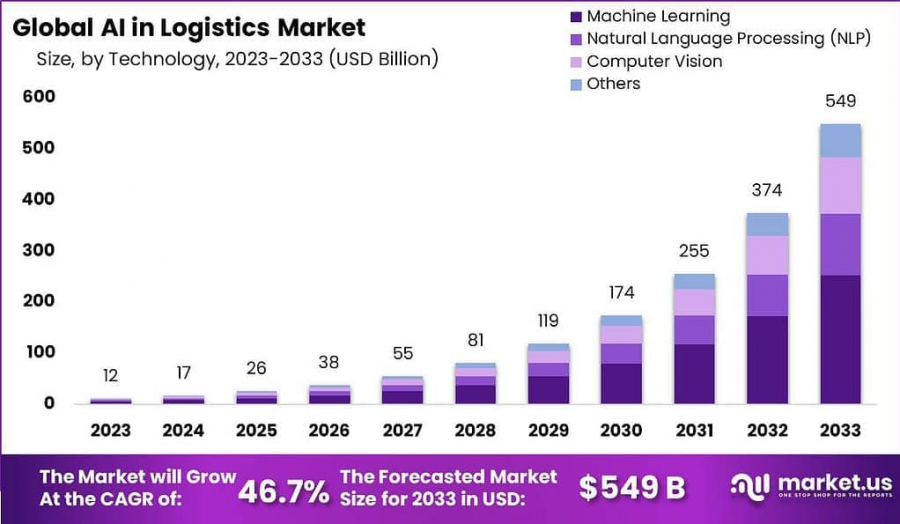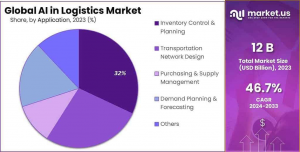
AI in Logistics Market to exceed US$ 549B by 2033, led by Machine Learning (46%), with North America at 41%.
The AI in Logistics market is set to hit US$ 549 billion by 2033, growing at a strong 46.7% CAGR (2024-2033), transforming global supply chains.
NEW YORK, NY, UNITED STATES, January 24, 2025 /EINPresswire.com/ -- According to information from Market.us, The AI in logistics market is expanding rapidly, driven by the need for automation and efficient data-driven decision-making in supply chains. As businesses globally strive to reduce operational costs and improve service delivery, the adoption of AI technologies in logistics is expected to grow. This market encompasses a range of AI applications, from autonomous vehicles and drones for delivery to advanced predictive analytics for inventory and supply chain management.
Major driving factors for the AI in logistics market include the increasing volume of data generated in supply chain activities, the need for enhanced visibility and forecasting in logistics operations, and the pressure on logistics companies to deliver goods faster and more reliably. Additionally, the rising demand for automation to reduce human error and improve process efficiency is propelling the market forward.
Market trends in AI in logistics include the adoption of cloud-based AI solutions, which provide scalability and accessibility, and the use of machine learning algorithms for better demand forecasting and route optimization. There is also a significant trend towards the use of Internet of Things (IoT) devices integrated with AI to monitor assets and manage warehouse operations more efficiently.
👉 𝐁𝐮𝐲 𝐍𝐨𝐰 𝐭𝐡𝐢𝐬 𝐏𝐫𝐞𝐦𝐢𝐮𝐦 𝐑𝐞𝐩𝐨𝐫𝐭 𝐭𝐨 𝐆𝐫𝐨𝐰 𝐲𝐨𝐮𝐫 𝐁𝐮𝐬𝐢𝐧𝐞𝐬𝐬: https://market.us/purchase-report/?report_id=116996
Key benefits for stakeholders in the AI in logistics market include reduced operational costs, enhanced customer satisfaction through improved delivery services, and increased competitiveness due to streamlined operations. Stakeholders, such as logistics providers, tech companies, and end-users, benefit from the adoption of AI as it leads to smarter, more connected, and more efficient logistic operations.
Key Takeaways
AIn 2023, Machine Learning led the technology segment, holding over 46% of the market share, driven by its impact on optimizing logistics and supply chain operations.
The Inventory Control & Planning segment was significant in 2023, commanding over 32% of the market share, emphasizing the importance of inventory management in logistics.
In 2023, the Retail segment captured more than 29% of the market, reflecting the growing use of AI to improve operations and customer service in retail logistics.
North America, particularly the United States, dominated the AI in Logistics market in 2023, with a market share exceeding 41%, thanks to early adoption and technological advancements in logistics.
AI applications for predictive maintenance and asset monitoring are expected to grow by 45% between 2022 and 2024, allowing machines to predict breakdowns before they happen.
Nearly 50% of logistics companies are preparing to use AI-powered robots in warehouses by the end of 2024, improving automation and reducing human labor.
By 2024, over 65% of AI tools in logistics will be integrated with IoT devices and sensors, creating a connected ecosystem that enhances operational efficiency.
AI adoption for last-mile delivery optimization is expected to increase by 40% between 2022 and 2024, improving speed and efficiency in the final delivery stages.
Over 55% of AI in logistics will leverage Natural Language Processing (NLP) for customer service and chatbots by 2024, enhancing the customer experience through smarter interactions.
Around 45% of logistics companies aim to use AI to strengthen and secure their supply chains by the end of 2024, mitigating risks and improving resilience.
By 2024, over 70% of AI platforms in logistics will feature robust cybersecurity, ensuring data protection and secure operations.
The use of AI to match freight bookings and loads is expected to grow by 35% between 2022 and 2024, streamlining the process of connecting shipments with the right transportation.
By 2024, more than 60% of AI in logistics will be cloud-based, providing flexibility and remote accessibility for better management and control.
👉 𝐃𝐨𝐧'𝐭 𝐦𝐢𝐬𝐬 𝐨𝐮𝐭 𝐨𝐧 𝐛𝐮𝐬𝐢𝐧𝐞𝐬𝐬 𝐨𝐩𝐩𝐨𝐫𝐭𝐮𝐧𝐢𝐭𝐢𝐞𝐬 | 𝐆𝐞𝐭 𝐬𝐚𝐦𝐩𝐥𝐞 𝐩𝐚𝐠𝐞𝐬 𝐚𝐭: https://market.us/report/ai-in-logistics-market/free-sample/
Analysts’ Viewpoint regarding AI in Logistics Market
Investment Opportunities and Risks:
The integration of artificial intelligence (AI) in logistics presents several investment opportunities alongside inherent risks. AI technologies are fundamentally reshaping the logistics industry by enhancing efficiency through predictive analytics and automation. These advancements allow for more accurate demand forecasting and inventory management, which are crucial for reducing overhead costs and improving service delivery. For instance, AI's predictive capabilities enable companies to dynamically manage inventory and anticipate market demands, thereby minimizing wastage and avoiding stockouts.
However, the deployment of AI in logistics is not without risks. The high initial costs of AI implementation, including investments in technology and training, pose a significant barrier, especially for small to medium enterprises. Moreover, the integration of AI with existing legacy systems can be complex and disruptive. Data privacy and security concerns also loom large as AI systems often process and store vast quantities of sensitive data, necessitating robust cybersecurity measures to prevent breaches.
Technological Impact
AI's impact on logistics is profound, driving not only cost efficiencies but also technological innovation across various operations. AI facilitates smart warehousing, where automated systems enhance the accuracy and speed of order processing. Autonomous vehicles and drones are set to revolutionize delivery processes, particularly in last-mile delivery, reducing human error and operational costs. AI also contributes to sustainable practices by optimizing routes and reducing fuel consumption.
Time to Invest - Here To Stay!
The logistics industry is gearing up for a major transformation, with artificial intelligence (AI) at the forefront of this change. According to DHL, by 2024, over 65% of companies in the logistics sector are expected to integrate AI into their operations. This shift is aimed at boosting efficiency and enhancing accuracy across various logistical processes.
FedEx has also shared insights into the growing reliance on AI, predicting that the use of AI for route optimization and fleet management will surge by 50% between 2022 and 2024. This trend highlights a move towards more intelligent and adaptive logistics solutions that can respond dynamically to operational demands.
UPS sheds light on another key area of AI application in logistics: demand forecasting and inventory management. By the end of 2024, approximately 55% of logistics firms plan to deploy AI technologies to better predict customer needs and manage inventory, ensuring resources are used more judiciously and waste is minimized.
IBM further supports these observations, estimating that over 70% of AI platforms utilized in the logistics industry will include sophisticated data visualization and analytics tools by 2024. This development indicates a future where logistics operations are not just powered by AI but are also enhanced by deep, actionable insights from complex data analysis.
Report Segmentation
Technology Analysis
The Machine Learning (ML) segment emerged as a powerhouse within the AI in Logistics market, securing a commanding 46% share. This prominent position reflects the critical role that ML technologies play in enhancing decision-making processes and operational efficiency within logistics. Machine learning algorithms are adept at analyzing large volumes of data to predict trends, optimize routes, and manage resources effectively. The adoption of these technologies has been driven by their ability to offer substantial improvements in accuracy and speed over traditional methods, making logistics operations more responsive and cost-effective.
Application Analysis
Turning to applications, the Inventory Control & Planning segment proved to be pivotal, achieving a 32% share of the market in 2023. This segment benefits greatly from AI, particularly in managing and optimizing stock levels to meet fluctuating demand without overstocking or understocking. AI systems in this area use predictive analytics to provide real-time insights into inventory needs, enhancing the ability to react swiftly to changing market conditions. This not only reduces the capital tied up in inventory but also improves service levels by ensuring products are available when and where they are needed.
Industry Vertical Analysis
In the industry verticals, the Retail sector stood out, capturing a significant 29% share of the AI in Logistics market. Retailers are increasingly turning to AI to navigate the complexities of modern supply chains that are characterized by a high demand for speed and accuracy. AI helps in predicting consumer buying patterns, managing inventory more efficiently, and streamlining the delivery process. The competitive edge provided by AI in managing these logistical challenges is crucial for retailers aiming to meet the high expectations of consumers and maintain a robust bottom line.
👉 𝐆𝐞𝐭 𝐏𝐃𝐅 𝐅𝐨𝐫 𝐌𝐨𝐫𝐞 𝐏𝐫𝐨𝐟𝐞𝐬𝐬𝐢𝐨𝐧𝐚𝐥 𝐀𝐧𝐝 𝐓𝐞𝐜𝐡𝐧𝐢𝐜𝐚𝐥 𝐈𝐧𝐬𝐢𝐠𝐡𝐭𝐬@ https://market.us/report/ai-in-logistics-market/request-sample/
Regional Analysis
In 2023, North America solidified its leadership in the AI in Logistics sector, boasting a substantial 41% market share. The region's demand for AI-driven logistics solutions was impressively valued at USD 5.0 billion. This dominant position can be attributed to several key factors that have uniquely positioned North America at the forefront of this technological integration into logistics.
North America is home to a robust technological infrastructure and a culture of innovation that significantly contributes to its leading position. The region benefits from the presence of numerous tech giants and startups focused on AI research and development. This concentration of technology firms fosters a competitive environment where continuous improvements in AI applications are encouraged and rapidly implemented. The availability of advanced technologies and expertise enables logistics companies in North America to integrate more sophisticated AI tools that streamline operations and enhance efficiency.
Market Dynamics
Driver: Enhanced Operational Efficiency
One of the principal drivers of AI in the logistics sector is the significant enhancement in operational efficiency it offers. AI technologies enable advanced demand forecasting, optimizing inventory levels to meet customer demand without overstocking. By leveraging predictive analytics, logistics companies can plan more effectively, minimizing waste and reducing costs associated with excess inventory or last-minute procurement. Real-time data processing through AI algorithms also facilitates dynamic route optimization, ensuring faster and more efficient deliveries. These AI-driven improvements not only streamline operations but also boost the overall responsiveness of the supply chain, enhancing competitiveness in a fast-evolving market landscape.
Restraint: High Implementation Costs
Despite the benefits, the high cost of implementing AI systems presents a significant restraint. The integration of AI into logistics requires substantial initial investments in technology and infrastructure. For many companies, particularly smaller ones, these costs can be prohibitive. Furthermore, the integration of AI with legacy systems poses technical challenges and can incur additional expenses. These factors collectively contribute to a slower adoption rate of AI technologies within the logistics industry, as companies must weigh the potential returns against the upfront financial burden.
Opportunity: Increasing Supply Chain Visibility
AI offers a remarkable opportunity to increase supply chain visibility, which is crucial for logistics companies aiming to enhance service delivery and operational control. Through the integration of AI with IoT devices and cloud platforms, businesses can achieve real-time tracking and monitoring of shipments. This capability allows for proactive management of the supply chain, from predicting potential disruptions to adjusting operations dynamically in response to real-time conditions. Enhanced visibility not only improves operational reliability but also drives customer satisfaction by providing precise tracking and delivery forecasting.
Challenge: Data Management and Integration Complexity
A significant challenge in adopting AI within logistics is managing the vast amounts of data required for AI systems to function effectively and integrating these systems with existing IT infrastructure. Data quality, privacy, and security are major concerns, as logistics companies must ensure that their AI systems comply with international data protection regulations. Additionally, the technical complexity of retrofitting AI into existing platforms can be daunting, requiring specialized skills that are currently scarce in the logistics sector.
Top Market Leaders
IBM Corporation
Intel Corporation
Amazon Web Services, Inc.
Microsoft Corporation
Oracle Corporation
NVIDIA Corporation
Transportation Applied Intelligence, LLC
Pluto7
GEODIS
Other Key Players
Conclusion
In conclusion, AI in logistics is transforming the industry by driving efficiency, reducing costs, and enhancing customer experiences. With advancements in machine learning, predictive analytics, and automation, the logistics sector is poised for significant growth and innovation. The increasing adoption of AI-powered solutions reflects the industry's shift towards data-driven decision-making and improved supply chain resilience.
As market trends continue to favor automation, scalability, and integration with emerging technologies like IoT, AI will remain a critical enabler of success for logistics providers and stakeholders. Embracing AI is no longer a choice but a necessity to stay competitive in a fast-evolving market landscape.
𝐔𝐧𝐥𝐨𝐜𝐤 𝐌𝐨𝐫𝐞 𝐈𝐧𝐬𝐢𝐠𝐡𝐭𝐬
Digital Twin in Aerospace and Defence Market - https://market.us/report/digital-twin-in-aerospace-and-defence-market/
Online Exam Proctoring Market - https://market.us/report/online-exam-proctoring-market/
Multi-Channel Network (MCN) Market - https://market.us/report/multi-channel-network-mcn-market/
Commercial Payment Cards Market - https://market.us/report/commercial-payment-cards-market/
3D Printing Market - https://market.us/report/3d-printing-market/
AI In Fintech Market - https://market.us/report/ai-in-fintech-market/
Air Charter Broker Market - https://market.us/report/air-charter-broker-market/
Legal Process Outsourcing Market - https://market.us/report/legal-process-outsourcing-market/
AI-Powered Video Editing Software Market - https://market.us/report/ai-powered-video-editing-software-market/
Lawrence John
Prudour
+91 91308 55334
Lawrence@prudour.com
Visit us on social media:
Facebook
LinkedIn
Distribution channels: Shipping, Storage & Logistics
Legal Disclaimer:
EIN Presswire provides this news content "as is" without warranty of any kind. We do not accept any responsibility or liability for the accuracy, content, images, videos, licenses, completeness, legality, or reliability of the information contained in this article. If you have any complaints or copyright issues related to this article, kindly contact the author above.
Submit your press release


